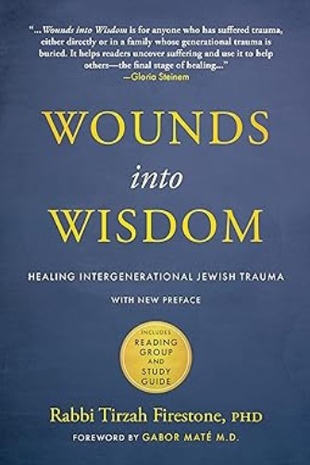S&P's Contributing Editor, Jon M. Sweeney, had an “Off the Page" conversation with Rabbi Tirzah Firestone about “Wounds into Wisdom" on December 20, 2023. Watch the video below.
When I was first introduced to this book, I was skeptical. The promise of the title and subtitle — is that possible? But I was soon guided on a clear and profound journey by a wise woman who taught from her lived and professional experiences. And now, with the explosion of war in Israel/Palestine, this work is even more important. This book helps explain many of the unique challenges of the region.
The Holocaust was the apex of centuries of Jewish persecution and historical oppression that have profoundly impacted the nature and experience of Jews, if not quite of Judaism itself. Rabbi Dr. Firestone, the child of a family deeply impacted by horrors of WWII, discovered the impact of this on her life after fleeing a traditional Jewish home and turning to the study of psychology, specifically trauma. Only after significant work within the Jewish community did she turn back to rediscover a Judaism she had never known.
Firestone teaches that intergenerational trauma is a product of both nurture and nature. We would expect someone who grows up in a family system deeply impacted by trauma to learn the resultant behaviors, perspectives, fears, and habits. Animal studies, however, suggest that trauma changes biology, altering how genes are expressed. In one experiment the offspring of mice traumatized in connection with exposure to a stimulus will show the same response to that stimulus immediately upon birth; no learning from mama required.
A number of the case studies presented in the book are those of Israelis. Some are related to past family trauma. Others react to the trauma of living in a country constantly at war and at risk. Military service is required for most Israelis and that service can also be a significant source of trauma. It seems safe to assume that exposure to more than one of these traumas is common. (The excerpt accompanying this review describes the experience of one of Firestone’s Israeli clients.)
While not discussed in the book, it is easy to apply these trauma studies to the Palestinian community, as well, who for decades have lived in displacement and with insecurity and violence. Generations of families have known nothing but life in refugee camps. After reading the book it is much clearer why this conflict is intractable, as well as why many aspects of it make little sense to the rest of the world.
Aspects of Jewish tradition make an appearance here, the most difficult being the concept of “chosenness.” Long misunderstood, misinterpreted, or used as a reason for others to oppress Jews, chosenness can also contribute to, or amplify, the effects of trauma, particularly the protective response of othering. Learning to resist this response to historically being the other and to redefine chosenness are two of seven principles presented as means of healing from trauma. Others include facing pain, taking action, and to shift from a perception of being a victim.
This is not easy book to read, but it is important, especially now.
Go Deeper:
ReStorying Your Life: An E-Course that guides you through "life review" of your history, grief and gratitude, present path, and legacy.
For Such a Time as This: Reflections and spiritual practices for peace and to acknowledge the complexity of the Israel/Palestine war.
______
Michal Woll is Rabbi of Congregation Shir Hadash in Milwaukee and coauthor of Mixed-Up Love: Relationships, Family, and Religious Identity in the 21st Century.
